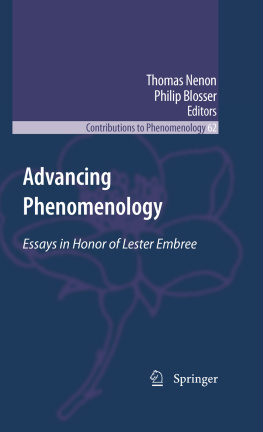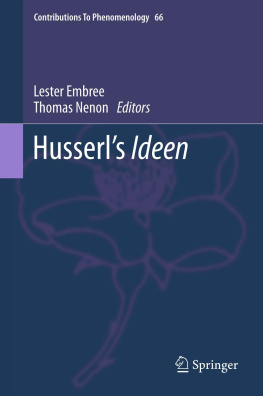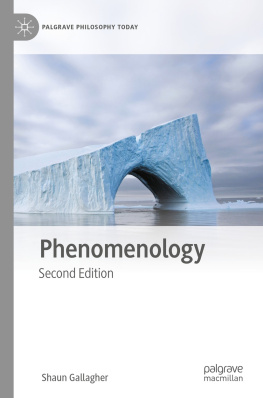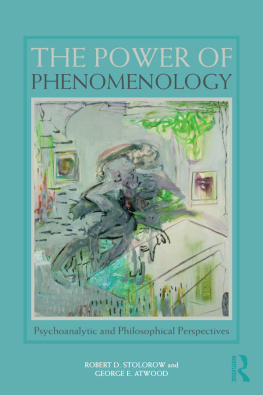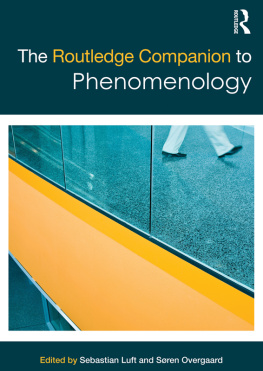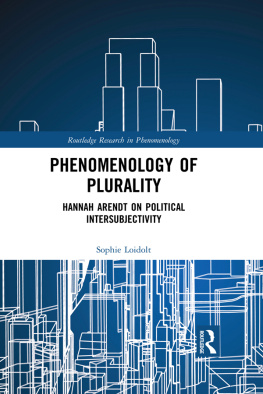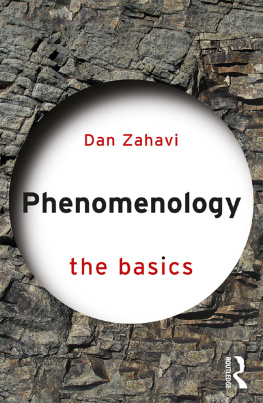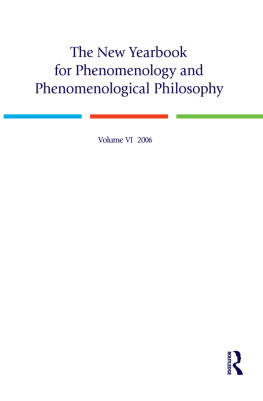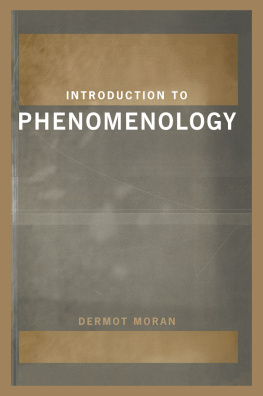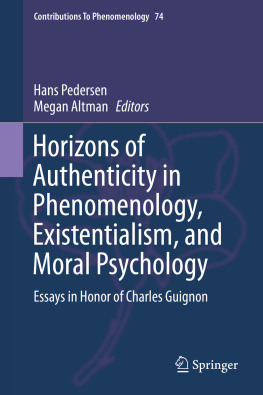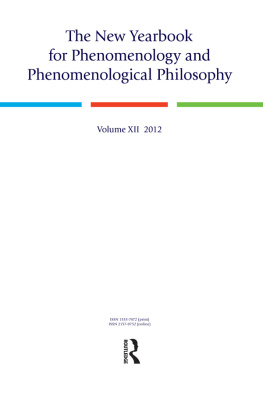Thomas Nenon and Philip Blosser (eds.) Contributions To Phenomenology Advancing Phenomenology Essays in Honor of Lester Embree 10.1007/978-90-481-9286-1_1 Springer Science+Business Media B.V. 2010
The essays in the volume were assembled in honor of Lester Embree, who celebrated his 70th birthday on January 9, 2008. A preview of this volume was presented to Professor Embree at a reception sponsored by the Center for Advanced Research in Phenomenology that was held in his honor at the 2008 meeting of the Husserl Circle at Marquette University in Milwaukee, Wisconsin.
The title Advancing Phenomenology is purposely ambiguous. On the one hand, these essays document the progress that phenomenology as an ongoing and vibrant movement has made in the period of over a century since its inception. They illustrate the advance of phenomenology both in terms of the range of topics represented in this volume and in terms of the disciplinary and geographical diversity of the scholars who have contributed to it. The topics range from scholarly appropriations of past achievements in phenomenology, to concrete phenomenological investigations into ethics, gender, and environmental philosophy, as well as phenomenological reflections on the foundations of disciplines outside philosophy such as psychology, history, the social sciences, and archeology. The contributors come both from philosophy departments and from a number disciplines outside of philosophy such as sociology, psychology, and archeology; and they come from all around the world from North America, from Western and Eastern Europe, from Latin America, and from several different countries in Asia. Together, these essays testify to the breadth and geographical reach of phenomenology at the beginning of the twenty-first century. We also believe that they provide good evidence of the seriousness and fruitfulness of current research in phenomenology today.
As many of these essays document in their footnotes and references, Lester Embrees scholarly contributions have been influential in this regard. Two the essays in this volume (Marcelle, pp. 195220 and Nenon, pp. 455462) discuss in some detail how Embrees organizational skills and energies have also been crucial in maintaining and expanding the phenomenological tradition across disciplines and across national and continental boundaries. Hence, the title for this volume was also chosen in light of the crucial role that Embree has played over the last three decades in advancing phenomenology as one of the twentieth and twenty-first centuries leading intellectual traditions and research methods and in bringing together scholars and younger researchers from around the world and from across disciplines to share their insights and to work together to continue the important traditional of phenomenological work.
The volume begins with the essay from Thomas Seebohm, who sets the stage for the subsequent essays by locating the unique contribution of phenomenology as a positive alternative to what seemed to be the exclusive disjuncts in philosophical approaches at the beginning of the twentieth century, both of which naturalism and historicism were inappropriately reductive and did not allow for a proper recognition of the wide variety of the kinds of objects and kinds of knowledge that philosophical approaches must be able to accommodate if they are to be consistent with the experiences of our daily lives. The articles by Sepp, Rabanaque, Zirin, Tani, Li, and Behnke then address key issues in phenomenological methodology and practice as developed by Husserl by undertaking phenomenological analyses to try to clarify these issues and providing independent justification for them as important tools for continued work in the phenomenological tradition. McKenna,Walton, and Lerner also take Husserlian texts as their starting points for discussions of specific classic philosophical issues, namely perception, worldhood, and alterity, examining the phenomenological evidence underlying the positions presented in those texts to argue for the cogency of those insights.
The subsequent essays recall that the phenomenological tradition includes figures other than Husserl, for instance Morans essay on Husserl and Merleau-Ponty on embodied experience, Marcelles essay on Gestalt-theory in Husserl and Gurwitsch, Deprazs essay on Levinas and Merleau-Ponty in light of Jonas, Lees essay on Husserl and Hambermas, and Blossers essay on Schelers phenomenological ethics. They also serve to remind us that phenomenology has profound implications not just for issues in theoretical philosophy, but also for issues in practical philosophy and for ethics in areas outside of philosophy.
Much of Embrees own work was devoted to the cultivation of phenomenology as a methodological approach and a tradition that could contribute significantly to disciplines other than academic philosophy. Zaners contribution is a good example of the way that he has used phenomenological concepts and methods to develop some of the most original and important approaches to questions in what is often called biomedical ethics or in the ethics of care-giving within the medical professions for several decades now. Ion Copoeru from Romania recounts how a phenomenological approach has proven helpful in the reform of judicial practice in light of the recent revolutionary changes in his country. Another more recent development within the phenomenological tradition is the application of phenomenological insights and approaches to address problems in environmental theory and environmental ethics. The contributions by Pintos, Toadvine, and Melle represent fine examples of such work in this area.
The influence of phenomenology in other disciplines is also illustrated well in the essays by Casey in phenomenological work in architecture, by Brown on the theory of archeology, and by Yu and Nasu on Schutzs phenomenological work in the social sciences. Michael Barbers essay is a good example of another recent trend in phenomenological work, namely an attempt to establish a dialogue between work in the phenomenological tradition and recent work in analytical philosophy. Finally, Nenons article provides an overview of Lester Embrees practical contributions to phenomenology, Kerstens contribution of a letter from the man who was perhaps Embrees most influential teacher, namely Dorion Cairns, along with a brief commentary on it, and a copy of Lester Embrees curriculum vitae through 2008 that documents his extensive publication and service record, round out the volume by helping locate Embrees own work over the course of a long career within this ongoing tradition that he has done so much to advance.
It is worth noting that the list of the contributors to this volume also provides an indication of many of Embrees direct personal contacts throughout his career, something that is appropriate and common for a scholarly volume that also functions as a Festschrift . Fred Kersten, Richard Zaner, and Bill McKenna were fellow students with Embree at the New School during what recently been called its Golden Age. into Castillian.

